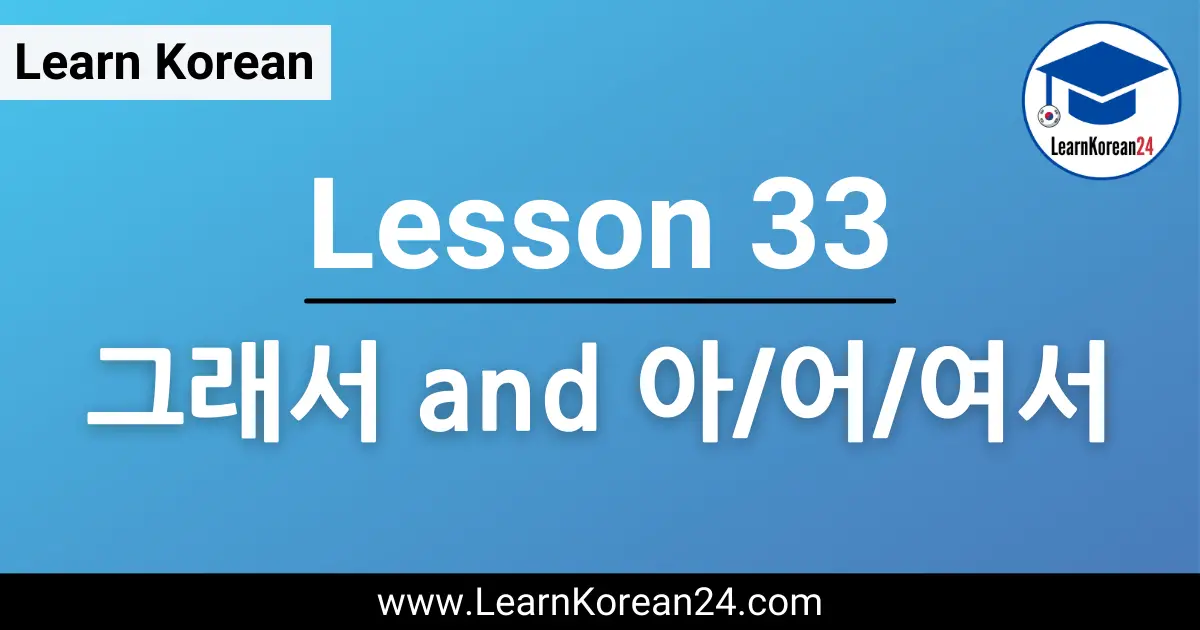Lesson 33: 그래서 and 아/어/여서
In this lesson, you will learn how to use the adverb 그래서 and the ending 아/어/여서 to express the cause or reason for something. 그래서 and 아/어/여서 are similar to the words ‘therefore’ or ‘so’ in English. By the end of this lesson, you will be able to say things like “I went to bed last night, so I’m tired now.”, “It’s raining now, so I can’t exercise.“, etc.
Lesson 33: 그래서 and 아/어/여서
그래서
그래서 is an adverb that means ‘so’ or ‘therefore’ in Korean. It connects two sentences when the preceding sentence is the reason or cause of the following sentence. 그래서 is always placed at the beginning of the following sentence. Let’s look at some examples.
이 옷이 작아요. = These clothes are small.
못 입어요. = I can’t wear them.
이 옷이 작아요. 그래서 못 입어요. = These clothes are small. So, I can’t wear them.
오늘 날씨가 좋아요. = The weather is good today.
산책하고 싶어요. = I want to go for a walk.
오늘 날씨가 좋아요. 그래서 산책하고 싶어요. = The weather is good today. So, I want to go for a walk.
아/어/여서
아/어/여서 is an ending that means ‘so’ or ‘therefore’ in Korean. It is used to connect two clauses in the same sentence. 아/어/여서 is attached to the verb stem in the first clause. Let’s look at some examples.
내일 시험이 있어요. = I have an exam tomorrow.
지금 공부해야 돼요. = I should study now.
내일 시험이 있어서 지금 공부해야 돼요. = I have an exam tomorrow, so I should study now.
지금 비가 와요. = It’s raining now.
운동을 못 해요. = I can’t exercise.
지금 비가 와서 운동을 못 해요. = It’s raining now, so I can’t exercise.
| Conjugation Rule | Examples |
|---|---|
| Last vowel In Verb Stem is ㅏ or ㅗ + 아서 | 살다 (to live) → 살아서 |
| Last vowel In Verb Stem is NOT ㅏ or ㅗ + 어서 | 먹다 (to eat) → 먹어서 |
| Verb Ends In 하다 + 여서 | 일하다 (to work) → 일해서 |
Things To Note:
When using 아/어/여서 to express the reason for an action that took place in the past, the past tense ending is not attached to the verb preceding 아/어/여서. Here is an example:
I went to bed late last night. So, I feel tired today. =
어제 밤에 늦게 자서 오늘 피곤해요. (O)
어제 밤에 늦게 잤어서 오늘 피곤해요. (X)
Another thing to note is that with 감사합니다 (Thank you) and 죄송합니다 (Sorry) 아/어/어서 is used and not 그래서. Here are some examples:
늦어서 죄송합니다. = I’m sorry to be late. (lit. “I’m late, so I am sorry.”)
도와주셔서 감사합니다. = Thank you for helping me. (Lit. “You helped me, so thanks.”)
Example Sentences
왜 한국어를 배워요? = Why do you learn Korean?
한국에 가고 싶어요. 그래서 한국어를 배워요. = I want to go to Korea. So, I learn Korean.
왜 택시를 탔어요? = Why did you take a taxi?
늦게 일어나서 택시를 탔어요. = I woke up late, so I took a taxi.
왜 기분이 안 좋아요? = Why do you feel bad? (Lit. “Why mood is not good?”)
친구하고 싸웠어요. 그래서 기분이 안 좋아요. = I had an argument with my friend. So, I feel bad.
왜 병원에 갔어요? = Why did you go to the hospital?
배가 아파서 병원에 갔어요. = My stomach hurt, so I went to the hospital.


